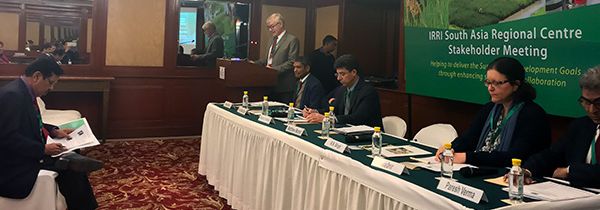New Delhi, India (15th December 2017) – In a precursor to the launch of a new regional agriculture research centre, Shri S.K. Pattanayak, Secretary of Indian Department of Agriculture, Cooperation and Farmers Welfare emphasized the need for improved south-south collaboration in rice-based agri-food systems to accelerate progress towards the Sustainable Development Goals (SDGs).
Secretary Pattanayak made the comments at a round-table discussion hosted by the International Rice Research Institute (IRRI) at the India Habitat Centre.
Congratulating IRRI, he said the upcoming launch of the IRRI South Asia Regional Centre (ISARC) is a step in the right direction as the first international center in eastern India to drive initiatives focused on improving the rice value chain in the region.
The roundtable discussion included representation from the Bill and Melinda Gates Foundation, Bioseed South East Asia Foundation, International Fund for Agricultural Development, USAID, Central Agricultural University. It was held as a lead up to the anticipated launch, in early 2018, of the IRRI South Asia Regional Centre at Varanasi, Uttar Pradesh.
“IRRI is proud to contribute to Sustainable Development Goal 2 and Sustainable Development Goal 3. It is imperative that we work closely with partner countries to strengthen the links between food production and food consumption in order to maximize our ability to contribute to these goals.” said Dr. Matthew Morell, Director General of IRRI.
He went on to say, “Intensifying south-south collaboration will help meet the SDGs as well as the region’s food security needs to ensure that we are improving farmers’ livelihoods. A feasible model of south-south cooperation in agriculture research, such as the IRRI South Asia Centre, has the potential to change the lives of 145 million rice farmers all over the world.”
Secretary Pattanayak reiterated Dr. Morell’s sentiment, saying, “The setting up of this centre is an indication of what south-south cooperation can do. Africa is looking at us. We must go there.”
This state-of-the-art research hub will serve as a Centre of Excellence for scientists across the region to develop modern rice varieties suited to typical agro-ecological zones. It would enable better research collaboration and capacity building for scientists, researchers and farmers in some of the most vulnerable countries of South Asia and Africa.
In Asia, where most of the world’s rice is grown, nearly 20 million hectares of rice land is prone to flooding. Crop losses from flooding and salinity affect rice farmers each year, increasing the burden of poverty. In India and Bangladesh alone, more than 5 million hectares of rice field are flooded during most of the planting seasons. In Africa, where demand for rice is growing faster due to urbanization and changing consumer preference, crop losses from flooding impact the poorest of the poor.

